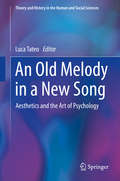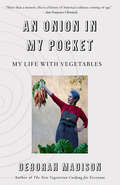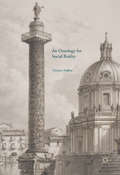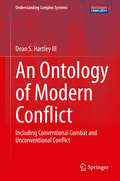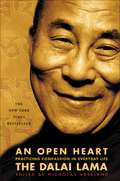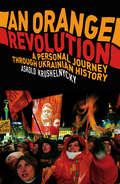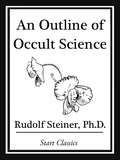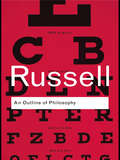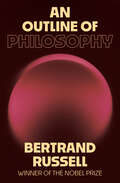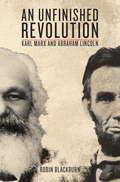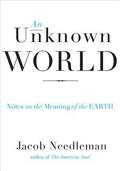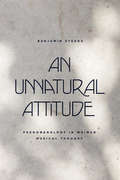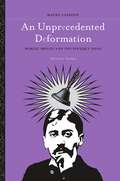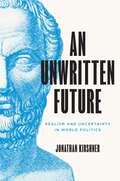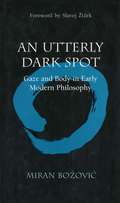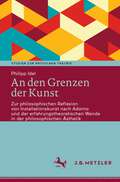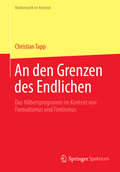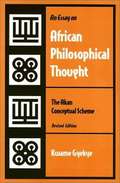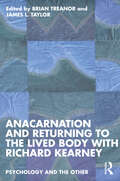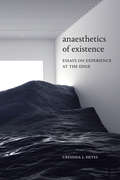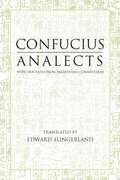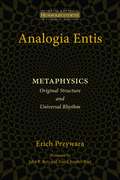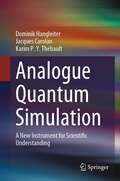- Table View
- List View
An Old Melody in a New Song: Aesthetics and the Art of Psychology (Theory and History in the Human and Social Sciences)
by Luca TateoThis book explores the relationship between cultural psychology and aesthetics, by integrating the historical, theoretical and phenomenological perspectives. It offers a comprehensive discussion of the history of aesthetics and psychology from an international perspective, with contributions by leading researchers from Serbia, Austria, Portugal, Norway, Denmark, and Brazil. The first section of the book aims at summarizing the debate of where the song comes from. It discusses undeveloped topics, methodological hints, and epistemological questions in the different areas of contemporary psychological sciences. The second section of the book presents concrete examples of case-studies and methodological issues (the new melodies in psychological research) to stimulate further explorations. The book aims to bring art back into psychology, to provide an understanding for the art of psychology. An Old Melody in a New Song will be of interest to advanced students and researchers in the fields of educational and developmental psychology, cultural psychology, history of ideas, aesthetics, and art-based research.
An Onion in My Pocket: My Life with Vegetables
by Deborah MadisonFrom the author of Vegetarian Cooking for Everyone ("The Queen of Greens," The Washington Post)--a warm, bracingly honest memoir that also gives us an insider's look at the vegetarian movement.Thanks to her beloved cookbooks and groundbreaking work as the chef at Greens Restaurant in San Francisco, Deborah Madison, though not a vegetarian herself, has long been revered as this country's leading authority on vegetables. She profoundly changed the way generations of Americans think about cooking with vegetables, helping to transform "vegetarian" from a dirty word into a mainstream way of eating. But before she became a household name, Madison spent almost twenty years as an ordained Buddhist priest, coming of age in the midst of counterculture San Francisco. In this charmingly intimate and refreshingly frank memoir, she tells her story--and with it the story of the vegetarian movement--for the very first time. From her childhood in Big Ag Northern California to working in the kitchen of the then-new Chez Panisse, and from the birth of food TV to the age of green markets everywhere, An Onion in My Pocket is as much the story of the evolution of American foodways as it is the memoir of the woman at the forefront. It is a deeply personal look at the rise of vegetable-forward cooking, and a manifesto for how to eat well.
An Ontology for Social Reality
by Tiziana AndinaThis book explores the complex domain of social reality, asking what this reality is, how it is composed and what its dynamics are in both theoretical and practical terms. Through the examination of some of the most important contemporary theories of social ontology, the book discusses the fundamentals of the discipline and lays the foundations for its development in the political sphere. By analyzing the notion of State and the redesign of ontology, the author argues in favor of a realist conception of the State and shows the reasons why this promotes a better understanding of the dynamics of power and the actualization of a greater justice between generations. This book captures the relationship between different generations within the same political context, and presents it as a necessary condition for the re-definition of the concepts of State and meta-State.
An Ontology of Modern Conflict: Including Conventional Combat and Unconventional Conflict (Understanding Complex Systems)
by Dean S. Hartley IIIThis volume develops and describes an ontology of modern conflict. Modern conflict is a complex adaptive system. As such, it exhibits emergent properties, or properties that are not predictable from simple descriptions of the system. The Modern Conflict Ontology (MCO) creates a structure for collecting and analyzing information regarding both conventional and unconventional conflict in the face of uncertainty. The first three chapters of the book begin the discussion of the MCO. The first chapter introduces the foundational concepts. The second chapter discusses modern conflict in detail. The third chapter provides an overview of ontologies in sufficient detail to make the rest of the book understandable, but without covering the minutia of the subject. The next ten chapters describe the parts of the MCO. Each part is a sub-ontology and is discussed in detail, including connections to the other parts. Instances are used very liberally to ensure that the concepts are made concrete. The final chapter consolidates the descriptions of the ontology into a discussion of “what we can know.” It describes the implementation history and changes from the predecessor Unconventional Conflict Ontology (UCO) to the MCO, plus some uses of the ontology and potential future enhancements. Providing an ontology that describes the entire modern conflict domain, this volume is appropriate for military professionals and academics and professionals in political science, computer science, and operations research.
An Open Heart: Practicing Compassion in Everyday Life
by Dalai LamaCompassion -- sympathy for the suffering of others and the desire to free them from it -- is wrestled with in all spiritual traditions. Yet how does one actually become a compassionate person? What are the mechanisms by which a selfish heart is transformed into a generous heart? When His Holiness the Dalai Lama came to New York in 1999, he spoke simply and powerfully on the everyday Buddhist practice of compassion. Weaving together the contents of several sacred texts, he showed that the path to compassion is a series of meditations. An Open Heart lays out this course of meditation, from the simplest to the most challenging, describing the mental training techniques that will enable anyone of any faith to change their minds and open their hearts. In these meditations the deepest and most profound insights of Buddhist practice become part of one's way of knowing and experiencing the world. An Open Heart is a clear and simple introduction to the Buddhist path to enlightenment, by its greatest teacher, His Holiness the Dalai Lama.
An Orange Revolution: A Personal Journey Through Ukrainian History
by Askold KrushnelnyckyIn December 2004, the world watched as hundreds of thousands of Ukrainians gathered to defy the results of a transparently rigged presidential election. The charismatic popular candidate, Viktor Yushchenko, had been poisoned and disfigured by his opponents. The security forces threatened violent repression. But the demonstrators stayed and, as international pressure grew, the corrupt old regime that had been supported by Putin's Kremlin was deposed. It was the most significant moment for Europe since the fall of the Berlin Wall.An Orange Revolution is the gripping account of this historic uprising and the events that led to it. Ukraine was treated roughly by the twentieth century, occupied by the Germans and annexed by the Soviets. It saw guerrilla fighting after the Second World War and dissent was crushed by successive Communist administrations. Its history has been one of corruption, power struggles, organised crime, but a resiliently optimistic population.Based on firsthand observation and interviews with major players and anonymous demonstrators alike, this is about a people who have forced a lasting change: judges who defied death threats, a murdered journalist, amateur musicians who composed an anthem for the people, and soldiers who staked their lives to back the opposition. An Orange Revolution also traces the story of the author's family, who paid a high price for speaking out. An Orange Revolution is a captivating book about a defining moment in European history.
An Outline of Occult Science
by Rudolf Steiner"It is not a question of merely making certain communications. Presenting them in a manner consistent with a conscientious view of the corresponding plane of life is the real challenge. This is the plane where the loftiest ambitions are often handled poorly, and where knowledge and superstition can become confused one with the other." Rudolf Steiner
An Outline of Philosophy (Routledge Classics Ser.)
by Bertrand RussellIn his controversial book An Outline of Philosophy, first published in 1927, Bertrand Russell argues that humanity demands consideration solely as the instrument by which we acquire knowledge of the universe. From our inner-world to the outer-world, from our physical world to the universe, his argument separates modern scientific knowledge and our ‘seeming’ consciousness. These innovative perspectives on philosophy made a significant contribution to the discourse on the meaning, relevance and function of philosophy which continues to this day.
An Outline of Philosophy (Routledge Classics Series)
by Bertrand RussellThe Nobel Prize–winning British scholar offers readers an introduction to philosophy and explores how we acquire knowledge from the world around us. British philosopher Bertrand Russell believed philosophy was concerned with the universe as a whole. In An Outline of Philosophy, he analyzes the differences between the physical world as defined by modern science and the reality we perceive as humans. He looks at methods of gaining knowledge, learning in infants and animals, as well as the role of linguistic ability. Finally, Russell discusses great philosophers from the past and how some of them might approach the question of humanity&’s place in the universe. Originally published in 1927, An Outline of Philosophy was considered quite controversial. However, Russell was awarded the Nobel Prize for Literature in 1950 &“in recognition of his varied and significant writings in which he champions humanitarian ideals and freedom of thought.&” &“A book of real value. . . . The writing is nearly always of the delightful clarity that we have learned to expect.&” —The Times Literary Supplement &“A book which we cannot afford to miss if we think at all.&” —The Spectator
An Unfinished Revolution: Karl Marx and Abraham Lincoln
by Abraham Lincoln Friedrich Engels Karl Marx Robin Blackburn Raya DunaevskayaKarl Marx and Abraham Lincoln exchanged letters at the end of the Civil War, with Marx writing on behalf of the International Working Men's Association. Although they were divided by far more than the Atlantic Ocean, they agreed on the urgency of suppressing slavery and the cause of "free labor." In his introduction Robin Blackburn argues that Lincoln's response to the IWA was a sign of the importance of the German American community as well as of the role of the International in opposing European recognition of the Confederacy. The International went on to attract many thousands of supporters in over fifty regions of the US, and helped to spread the demand for an eight-hour day--enacted by Congress in 1868 for Federal employees. Blackburn shows how the International in America--born out of the Civil War--sought to radicalize Lincoln's unfinished revolution and to advance the rights of labor, uniting black and white, men and women, native and foreign-born. The International contributed to a profound critique of the capitalist robber barons who enriched themselves during and after the war. It inspired an extraordinary series of strikes and class struggles in the postwar decades. In addition to a range of key texts and letters by both Lincoln and Marx, this book includes Raya Dunaevskaya's assessment of the impact of the Civil War on Marx's theory and a survey by Frederick Engels of the progress of US labor in the 1880s.
An Unknown World
by Jacob NeedlemanThe bestselling philosopher's unforgettable exploration of the true meaning of life on earth, now in paperback for the first time. What is the purpose of life on earth? In An Unknown World, philosopher Jacob Needleman frames man's role on the planet in a completely new and fresh way, moving beyond the usual environmental concerns to reveal how the care and maintenance of a world is something vital and basic to our existence as authentic human beings. "Striking . . . takes some really original positions on topics that have become run into the ground by the same discussions and same assumptions." --Ken Wilbur "His lively prose, storytelling skills and lucid insights draw us into an animated conversation with a brilliant teacher." --Publishers Weekly
An Unnatural Attitude: Phenomenology in Weimar Musical Thought (New Material Histories of Music)
by Benjamin SteegeAn Unnatural Attitude traces a style of musical thought that coalesced in the intellectual milieu of the Weimar Republic—a phenomenological style that sought to renew contact with music as a worldly circumstance. Deeply critical of the influence of naturalism in aesthetics and ethics, proponents of this new style argued for the description of music as something accessible neither through introspection nor through experimental research, but rather in an attitude of outward, open orientation toward the world. With this approach, music acquires meaning in particular when the act of listening is understood to be shared with others. Benjamin Steege interprets this discourse as the response of a young, post–World War I generation amid a virtually uninterrupted experience of war, actual or imminent—a cohort for whom disenchantment with scientific achievement was to be answered by reasserting the value of imaginative thought. Steege draws on a wide range of published and unpublished texts from music theory, pedagogy, criticism, and philosophy of music, some of which appear for the first time in English translation in the book’s appendixes. An Unnatural Attitude considers the question: What are we thinking about when we think about music in non-naturalistic terms?
An Unprecedented Deformation: Marcel Proust and the Sensible Ideas (SUNY series in Contemporary Continental Philosophy)
by Mauro CarboneFrench novelist Marcel Proust made famous "involuntary memory," a peculiar kind of memory that works whether one is willing or not and that gives a transformed recollection of past experience. More than a century later, the Proustian notion of involuntary memory has not been fully explored nor its implications understood. By providing clarifying examples taken from Proust's novel and by commenting on them using the work of French philosophers Maurice Merleau-Ponty and Gilles Deleuze, Italian philosopher Mauro Carbone interprets involuntary memory as the human faculty providing the involuntary creation of our ideas through the transformation of past experience. This rethinking of the traditional way of conceiving ideas and their genesis as separated from sensible experience—as has been done in Western thought since Plato—allows the author to promote a new theory of knowledge, one which is best exemplified via literature and art much more than philosophy.
An Unwritten Future: Realism and Uncertainty in World Politics (Princeton Studies in International History and Politics #186)
by Jonathan KirshnerAn argument for the classical realist approach to world politics An Unwritten Future offers a fresh reassessment of classical realism, an enduring approach to understanding crucial events in the international political arena. Jonathan Kirshner identifies the fundamental flaws of classical realism&’s would-be successors and shows how this older, more nuanced and sophisticated method for studying world politics better explains the formative events of the past. Kirshner also reveals how this approach is ideally equipped to comprehend the vital questions of the present—such as the implications of China&’s rise, the ways that social and economic change alter the balance of power and the nature of international conflict, and the consequences of the end of the US-led postwar order for the future of world politics.Laying out realism&’s core principles, Kirshner discusses the contributions of the perspective&’s key thinkers, including Thucydides, Hans Morgenthau, and Raymond Aron, among others. He illustrates how a classical realist approach gives new insights into major upheavals of the twentieth century, such as Britain&’s appeasement of Nazi Germany and America&’s ruinous involvement in Vietnam. Kirshner also addresses realism&’s limits and explores contemporary issues, including the ascent of great power challengers, the political implications of globalization, and the diffusion of power in modern world politics.A reexamination of the realist tradition, with a renewed emphasis on the crucial roles played by uncertainty, contingency, and contestation, An Unwritten Future demonstrates how a once-popular school of thought provides invaluable insights into pressing real-world problems.
An Utterly Dark Spot
by Miran BozovicSlovenian philosopher Miran Bozovic's An Utterly Dark Spot examines the elusive status of the body in early modern European philosophy by examining its various encounters with the gaze. Its range is impressive, moving from the Greek philosophers and theorists of the body (Aristotle, Plato, Hippocratic medical writers) to early modern thinkers (Spinoza, Leibniz, Malebranche, Descartes, Bentham) to modern figures including Jon Elster, Lacan, Althusser, Alfred Hitchcock, Stephen J. Gould, and others. Bozovic provides startling glimpses into various foreign mentalities haunted by problems of divinity, immortality, creation, nature, and desire, provoking insights that invert familiar assumptions about the relationship between mind and body. The perspective is Lacanian, but Bozovic explores the idiosyncrasies of his material (e.g., the bodies of the Scythians, the transvestites transformed and disguised for the gaze of God; or Adam's body, which remained unseen as long as it was the only one in existence) with an attention to detail that is exceptional among Lacanian theorists. The approach makes for engaging reading, as Bozovic stages imagined encounters between leading thinkers, allowing them to converse about subjects that each explored, but in a different time and place. While its focus is on a particular problem in the history of philosophy, An Utterly Dark Spot will appeal to those interested in cultural studies, semiotics, theology, the history of religion, and political philosophy as well.
An den Grenzen der Kunst: Zur philosophischen Reflexion von Installationskunst nach Adorno und der erfahrungstheoretischen Wende in der philosophischen Ästhetik (Studien zur Kritischen Theorie)
by Philipp IdelInstallationskunst verschiebt die Grenzen der Künste und der Kunst, indem sie die Künste füreinander und die Kunst für die außerkünstlerische Realität sowie für die Betrachterin öffnet. Das wirft nach Ansicht vieler die Frage auf, ob Installationskunst autonom ist. Die erfahrungstheoretische Ästhetik behauptet, Installationskunst als autonome Kunst begreiflich machen zu können, wodurch diese Ästhetik sich von Theodor W. Adornos Ästhetik unterscheide. Das Buch zeigt, dass das nicht zutrifft, und wie Adornos Ästhetik zur philosophischen Reflexion von Installationskunst beitragen kann.
An den Grenzen des Endlichen: Das Hilbertprogramm im Kontext von Formalismus und Finitismus (Mathematik im Kontext)
by Christian TappDer Mathematiker David Hilbert entwickelte mit seiner Beweistheorie ein Programm zur Grundlegung der Mathematik. In der ersten deutschsprachigen Monographie zum Thema bietet der Autor neue Deutungen des Hilbertprogramms. Ausgehend von den historischen Quellen stellt er die Frage neu, ob Hilbert eine formalistische Philosophie der Mathematik voraussetzte. Er macht die Fülle der Ideen sichtbar, die Hilbert und seine Schüler formulierten, diskutiert anspruchsvolle philosophische Implikationen und räumt mit einer Reihe von Fehlinterpretationen auf.
An essay on African philosophical thought The Akan conceptual scheme (Revised edition)
by Kwame GyekyeDefining the main principles of a distinct African philosophy, this work rejects the idea that an African philosophy consists simply of the work of Africans writing on philosophy. It argues that critical analyses of specific traditional African modes of thought are necessary to develop a distinctively African philosophy.
An introduction to Confucianism
by Xinzhong YaoTaking into account the long history and wide range of Confucian Studies, this book introduces Confucianism - initiated in China by Confucius (551 BC–479 BC) - primarily as a philosophical and religious tradition. It pays attention to Confucianism in both the West and the East, focussing on the tradition's doctrines, schools, rituals, sacred places and terminology, but also stressing the adaptations, transformations and new thinking taking place in modern times. Xinzhong Yao presents Confucianism as a tradition with many dimensions and as an ancient tradition with contemporary appeal. This gives the reader a richer and clearer view of how Confucianism functioned in the past and of what it means in the present. A Chinese scholar based in the West, he draws together the many strands of Confucianism in a style accessible to students, teachers, and general readers interested in one of the world's major religious traditions.
Anacarnation and Returning to the Lived Body with Richard Kearney (Psychology and the Other)
by James L. Taylor Brian TreanorThis edited collection responds to Richard Kearney’s recent work on touch, excarnation, and embodiment, as well as his broader work in carnal hermeneutics, which sets the stage for his return to and retrieval of the senses of the lived body. Here, fourteen scholars engage the breadth and depth of Kearney’s work to illuminate our experience of the body. The chapters collected within take up a wide variety of subjects, from nature and non-human animals to our experience of the sacred and the demonic, and from art’s account of touching to the political implications of various types of embodiment. Featuring also an inspired new reflection from Kearney himself, in which he lays out his vision for “anacarnation,” this volume is an important statement about the centrality of touch and embodiment in our experience, and a reminder that, despite the excarnating tendencies of contemporary life, the lived body remains a touchstone for wisdom in our increasingly complicated and fragile world. Written for scholars and students interested in touch, embodiment, phenomenology, and hermeneutics, this diverse and challenging collection contributes to a growing field of scholarship that recognizes and attempts to correct the excarnating trends in philosophy and in culture at large.
Anaesthetics of Existence: Essays on Experience at the Edge
by Cressida J. Heyes“Experience” is a thoroughly political category, a social and historical product not authored by any individual. At the same time, “the personal is political,” and one's own lived experience is an important epistemic resource. In Anaesthetics of Existence Cressida J. Heyes reconciles these two positions, drawing on examples of things that happen to us but are nonetheless excluded from experience. If for Foucault an “aesthetics of existence” was a project of making one's life a work of art, Heyes's “anaesthetics of existence” describes antiprojects that are tacitly excluded from life—but should be brought back in. Drawing on critical phenomenology, genealogy, and feminist theory, Heyes shows how and why experience has edges, and she analyzes phenomena that press against those edges. Essays on sexual violence against unconscious victims, the temporality of drug use, and childbirth as a limit-experience build a politics of experience while showcasing Heyes's much-needed new philosophical method.
Analects: With Selections from Traditional Commentaries (Hackett Classics)
by ConfuciusThis edition goes beyond others that largely leave readers to their own devices in understanding this cryptic work, by providing an entrée into the text that parallels the traditional Chinese way of approaching it: alongside Slingerland's exquisite rendering of the work are his translations of a selection of classic Chinese commentaries that shed light on difficult passages, provide historical and cultural context, and invite the reader to ponder a range of interpretations. The ideal student edition, this volume also includes a general introduction, notes, multiple appendices--including a glossary of technical terms, references to modern Western scholarship that point the way for further study, and an annotated bibliography.
Analogia Entis: Original Structure and Universal Rhythm (Ressourcement: Retrieval and Renewal in Catholic Thought (RRRCT))
by Erich PrzywaraAlthough Erich Przywara (1889–1972) was one of the preeminent Catholic theologians of his time and a profound influence on such people as Hans Urs von Balthasar and Joseph Ratzinger, he has remained virtually unknown in North America. This volume includes Przywara’s groundbreaking Analogia Entis, originally published in 1932, and his subsequent essays on the concept analogia entis -- the analogy between God and creation -- which has currency in philosophical and theological circles today.
Analogical Investigations
by Lloyd, G. E. R.Western philosophy and science are responsible for constructing some powerful tools of investigation, aiming at discovering the truth, delivering robust explanations, verifying conjectures, showing that inferences are sound and demonstrating results conclusively. By contrast reasoning that depends on analogies has often been viewed with suspicion. Professor Lloyd first explores the origins of those Western ideals, criticises some of their excesses and redresses the balance in favour of looser, admittedly non-demonstrative analogical reasoning. For this he takes examples both from ancient Greek and Chinese thought and from the materials of recent ethnography to show how different ancient and modern cultures have developed different styles of reasoning. He also develops two original but controversial ideas, that of semantic stretch (to cast doubt on the literal/metaphorical dichotomy) and the multidimensionality of reality (to bypass the realism versus relativism and nature versus nurture controversies).
Analogue Quantum Simulation: A New Instrument for Scientific Understanding
by Dominik Hangleiter Jacques Carolan Karim P. ThébaultThis book presents fresh insights into analogue quantum simulation. It argues that these simulations are a new instrument of science. They require a bespoke philosophical analysis, sensitive to both the similarities to and the differences with conventional scientific practices such as analogical argument, experimentation, and classical simulation.The analysis situates the various forms of analogue quantum simulation on the methodological map of modern science. In doing so, it clarifies the functions that analogue quantum simulation serves in scientific practice. To this end, the authors introduce a number of important terminological distinctions. They establish that analogue quantum ‘computation' and ‘emulation' are distinct scientific practices and lead to distinct forms of scientific understanding. The authors also demonstrate the normative value of the computation vs. emulation distinction at both an epistemic and a pragmatic level.The volume features a range of detailed case studies focusing on: i) cold atom computation of many-body localisation and the Higgs mode; ii) photonic emulation of quantum effects in biological systems; and iii) emulation of Hawing radiation in dispersive optical media. Overall, readers will discover a normative framework to isolate and support the goals of scientists undertaking analogue quantum simulation and emulation. This framework will prove useful to both working scientists and philosophers of science interested in cutting-edge scientific practice.
